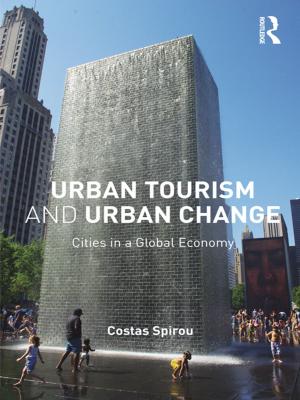Beyond the Networked City
Infrastructure reconfigurations and urban change in the North and South
Nonfiction, Science & Nature, Science, Earth Sciences, Geography, Social & Cultural Studies, Social Science, Human Geography| Author: | ISBN: | 9781317633693 | |
| Publisher: | Taylor and Francis | Publication: | December 14, 2015 |
| Imprint: | Routledge | Language: | English |
| Author: | |
| ISBN: | 9781317633693 |
| Publisher: | Taylor and Francis |
| Publication: | December 14, 2015 |
| Imprint: | Routledge |
| Language: | English |
Cities around the world are undergoing profound changes. In this global era, we live in a world of rising knowledge economies, digital technologies, and awareness of environmental issues. The so-called "modern infrastructural ideal" of spatially and socially ubiquitous centrally-governed infrastructures providing exclusive, homogeneous services over extensive areas, has been the standard of reference for the provision of basic essential services, such as water and energy supply. This book argues that, after decades of undisputed domination, this ideal is being increasingly questioned and that the network ideology that supports it may be waning.
In order to begin exploring the highly diverse, fluid and unstable landscapes emerging beyond the networked city, this book identifies dynamics through which a ‘break’ with previous configurations has been operated, and new brittle zones of socio-technical controversy through which urban infrastructure (and its wider meaning) are being negotiated and fought over. It uncovers, across a diverse set of urban contexts, new ways in which processes of urbanization and infrastructure production are being combined with crucial sociopolitical implications: through shifting political economies of infrastructure which rework resource distribution and value creation; through new infrastructural spaces and territorialities which rebundle socio-technical systems for particular interests and claims; and through changing offsets between individual and collective appropriation, experience and mobilization of infrastructure.
With contributions from leading authorities in the field and drawing on theoretical advances and original empirical material, this book is a major contribution to an ongoing infrastructural turn in urban studies, and will be of interest to all those concerned by the diverse forms and contested outcomes of contemporary urban change across North and South.
Cities around the world are undergoing profound changes. In this global era, we live in a world of rising knowledge economies, digital technologies, and awareness of environmental issues. The so-called "modern infrastructural ideal" of spatially and socially ubiquitous centrally-governed infrastructures providing exclusive, homogeneous services over extensive areas, has been the standard of reference for the provision of basic essential services, such as water and energy supply. This book argues that, after decades of undisputed domination, this ideal is being increasingly questioned and that the network ideology that supports it may be waning.
In order to begin exploring the highly diverse, fluid and unstable landscapes emerging beyond the networked city, this book identifies dynamics through which a ‘break’ with previous configurations has been operated, and new brittle zones of socio-technical controversy through which urban infrastructure (and its wider meaning) are being negotiated and fought over. It uncovers, across a diverse set of urban contexts, new ways in which processes of urbanization and infrastructure production are being combined with crucial sociopolitical implications: through shifting political economies of infrastructure which rework resource distribution and value creation; through new infrastructural spaces and territorialities which rebundle socio-technical systems for particular interests and claims; and through changing offsets between individual and collective appropriation, experience and mobilization of infrastructure.
With contributions from leading authorities in the field and drawing on theoretical advances and original empirical material, this book is a major contribution to an ongoing infrastructural turn in urban studies, and will be of interest to all those concerned by the diverse forms and contested outcomes of contemporary urban change across North and South.















